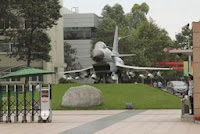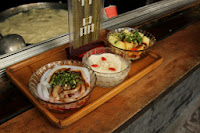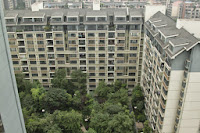Every time I visit HuangTianBa, a new shock shakes through my body. Buildings just grow out of the ground, taller with each visit. Shops and malls pop out of nowhere and people come and go. I went to China 3 years ago when they just begun the construction of 3 new buildings, right outside my grandparents’ condo. I returned last summer, and was taken aback to see 3 20-storey buildings.
 Every time we visit China, my parents always visit the Chengdu Aircraft Industry Group (成都飞机工业集团) where they had formally worked. There were many tall trees crowned with large, healthy leaves and multicolored flowers surrounding the base of the tree. There were shrubs and bushes with tiny red berries and many benches on the campus. The tiles were all cemented on the ground and not one was higher than the other. There were many large murals, clearly depicting airplanes and men smiling. There are plane models but we never saw them; I am only told of them in stories or see them in pictures. We walked along the entire perimeter of the building and my parents recalled many stories from their time there. We circled the living quarters of the worker. Most of the condos were a bit run down and the road was deserted, giving an abandoned feel. The windows were blue, much to my astonishment. My mother pointed one of the buildings and told us that that was where my dad lived. We walked through the whole premises not skipping a single road.
Every time we visit China, my parents always visit the Chengdu Aircraft Industry Group (成都飞机工业集团) where they had formally worked. There were many tall trees crowned with large, healthy leaves and multicolored flowers surrounding the base of the tree. There were shrubs and bushes with tiny red berries and many benches on the campus. The tiles were all cemented on the ground and not one was higher than the other. There were many large murals, clearly depicting airplanes and men smiling. There are plane models but we never saw them; I am only told of them in stories or see them in pictures. We walked along the entire perimeter of the building and my parents recalled many stories from their time there. We circled the living quarters of the worker. Most of the condos were a bit run down and the road was deserted, giving an abandoned feel. The windows were blue, much to my astonishment. My mother pointed one of the buildings and told us that that was where my dad lived. We walked through the whole premises not skipping a single road.When I came home from daycare, the first person I would meet was my 2-year-old sister, anticipating my return. Every day, she would bring my slippers over neatly and waited for me to put them on before asking me about my day. I would feel as if a queen, with a servant preening over me or a celebrity followed by a reporter and being asked about every single detail of my school day.
On our evening walk, I would sometimes see someone selling red, candy balls coated with sugar kabobs. The sugar coating would be hard and crunching, cracking when I bit into it while the soft inside was sour. The sweet and sour taste would blast through my mouth and fill my every thought in an instant. At that time, it was my favorite treat and whenever I saw it, I would plead and beg my grandparents to buy it for me.
At night, my grandmother would watch the news, but she never missed the Chinese National Anthem. My sister and I would anticipate all night for my grandmother to turn on the TV and when the familiar tune filled the room, my sister and I would leap off our chairs and start dancing. We pretended we were soldiers, marching on the spot and saluting with professional expressions. Our bodies were stiff and rigid, always erect while we sang along with my grandparents and parents who laughed in the background and cheered for us.
On my previous visit my grandmother Xiang ShiLin (向诗林), whose father (my great grandfather Xian DaiChang 向代昌) was the military Garrison commander of the Chengdu city (成都警备司令), showed me pins of Chairman Mao. Back in the 1960s, it was mandatory that everyone wore one to show respect for Mao. The pins came in different shape and sizes. Some were rectangular, others were circular, and a few were hexagons. Chairman Mao’s head would be golden on a red background, a sacred color in China. Sometimes, there would be five yellow stars, symbolizing China or the front gate of the Forbidden City. Now, the pins became collectables. I couldn't decide my favorite pin. They were all glittering at me and trying to catch my attention. At first I put one pin on. Suddenly, there would be a bright and colorful pin that I didn't see before and I would add it on to my shirt. Then my eyes rested on one with a unique design and I would pick it up and pin it to my shirt. Before I knew it, I had 5 or 6 pins on my T-shirt.
 There is a large colored picture in the middle of the living room right above a drawer depicting my sister and I in traditional Chinese dresses (mine was pink and my sisters was red) holding our hands in a gesture of respect and peace on a red background with fake firecrackers hanging on the right. The picture was taken in a photography store and was specifically bought and framed for my grandparents. Sometimes, my mom points out thing in the house that was there when she was a child and I see many pieces of furniture that sparks fading memories. At night, wrapped in a blanket that seemed somewhat familiar, I took a deep whiff. A flood of memories flashed through my mind, little clips of conversations, the sound of laughter, the joy when my dad visited me and all the places I went. Three generations of my family lived and thrived in China and although my home is on the other side of the earth, my roots have wriggled through miles of land and sea, reaching a place that is embossed in my heart and nourished me. Canada will always be my home but China is my third parent.
There is a large colored picture in the middle of the living room right above a drawer depicting my sister and I in traditional Chinese dresses (mine was pink and my sisters was red) holding our hands in a gesture of respect and peace on a red background with fake firecrackers hanging on the right. The picture was taken in a photography store and was specifically bought and framed for my grandparents. Sometimes, my mom points out thing in the house that was there when she was a child and I see many pieces of furniture that sparks fading memories. At night, wrapped in a blanket that seemed somewhat familiar, I took a deep whiff. A flood of memories flashed through my mind, little clips of conversations, the sound of laughter, the joy when my dad visited me and all the places I went. Three generations of my family lived and thrived in China and although my home is on the other side of the earth, my roots have wriggled through miles of land and sea, reaching a place that is embossed in my heart and nourished me. Canada will always be my home but China is my third parent.Remembering: China • Chengdu • HuangTianBa Part 1 China
Remembering: China • Chengdu • HuangTianBa Part 2 Chengdu
Remembering: China • Chengdu • HuangTianBa Part 3 HuangTianBa










